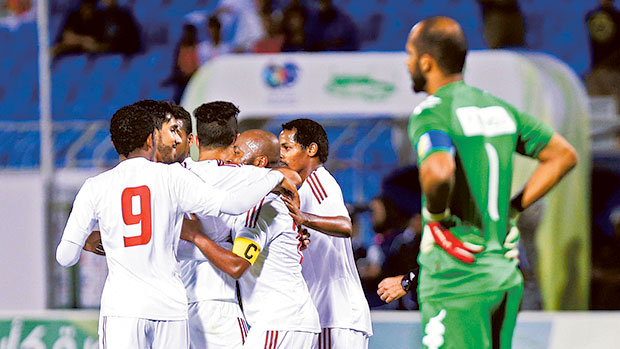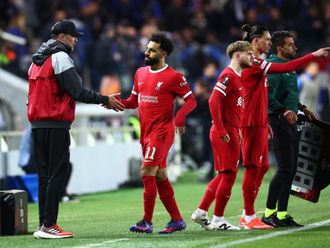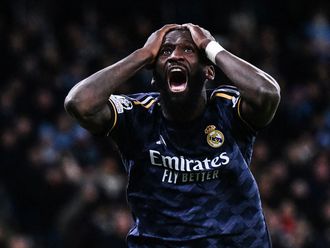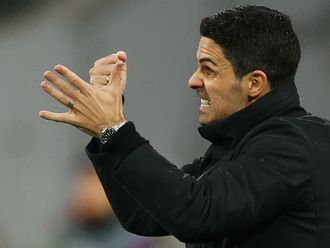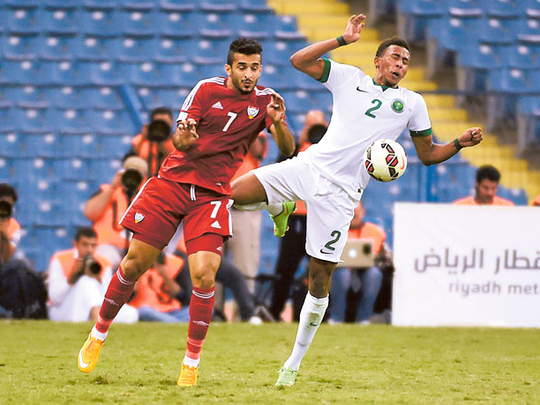
Riyadh: Ali Mabkhout’s Gulf Cup Golden Boot contention is one of many positives to take away from this campaign, according to UAE boss Mahdi Ali.
The defending champions finished third in the tournament after Mabkhout’s fifth goal of the competition gave the UAE a 1-0 win over Oman in the third place play-off at the Prince Faisal Bin Fahd Stadium here on Tuesday.
The UAE had earlier drawn a blank with Oman in the group stages but still finished second in Group B after Mabkhout scored two in a 2-2 draw with Kuwait and another two in a 2-0 win over Iraq.
However, he failed to score in the 3-2 semi-final defeat to hosts Saudi Arabia — which denied the UAE the chance to retain their title — leaving Ahmad Khalil to do the honours with a consolatory double.
Nevertheless, his coach was happy with his performance, which brings his overall UAE strike rate to 23 goals in 30 appearances.
At the time of going to print, Mabkhout’s five goals leaves him in firm contention for the Golden Boot with only Saudi Arabia’s Nasser Al Shamrani, Nawaf Al Abid and Qatar’s Ali Assadalla — all on two goals each — able to leapfrog him if they score four goals in Wednesday’s Gulf Cup final.
“One of the best things to take away from this tournament is Ali Mabkhout’s five goals,” said Mahdi Ali. “I’m very happy for him and hope he is able to be topscorer for the tournament.
“There is still one game left and you have to expect anything can happen in football, but we hope to at least come away with something good. He deserves to be top scorer.”
Ali wasn’t as elated with his team’s third place finish, however, and was quick to look ahead to January’s Asian Cup in Australia. “Our aim was not to finish third but this is football,” he added. “Anyway for us, we were happy with the performance of the team in this game, we were not lucky in this tournament and we now hope that the team will do well in the Asian Cup.”
The UAE had made eight changes to the team that lost to Saudi in the semi-final, while Oman had made six changes.
“Today we wanted to give a run out to as many players as possible so we can gauge their technical level, which will help us choose the final squad for the Asian Cup,” said Ali.
“When you play after only a day’s rest and you were so close to the final, that will no doubt have a negative effect on the players. Some of the players hadn’t recovered physically and others hadn’t played together before, like Esmail Ahmad and Walid Abbas.
“There are some things you can’t control, because the players may not be able to raise the standard in these circumstances, but I thank them for their efforts and hopefully we can make it up in the Asian Cup.”
Asked to assess his side’s overall Gulf Cup performance, Ali replied: “When we came here we had some difficulties with injuries that I didn’t want to talk about at the beginning of the tournament.
“Many players were not physically ready and were just returning from injury. We worked very hard for two weeks and tried to get them to their best level, but we could not.
“The tournament was very strong and there was a lot of pressure on all teams, from media and fans. Every game was like a derby. It was good to play under this pressure because our players will gain experience.
“One of the main things for us was to have the opportunity to assess the level of each player, because in a few weeks we will go to the Asia Cup, and this has given us the ability to evaluate them and help us select the right squad for the tournament based on performance.”


